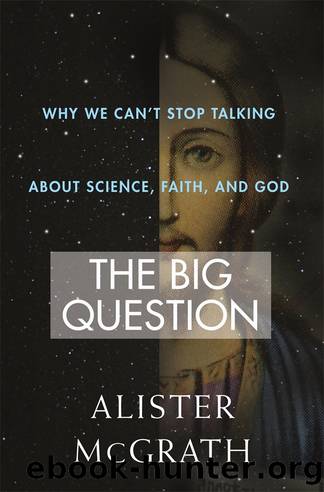The Big Question by Alister McGrath

Author:Alister McGrath
Language: eng
Format: epub
Publisher: St. Martin's Press
Published: 2015-09-16T16:00:00+00:00
Seven
The Quest for Meaning and the Limits of Science
Scientists are human beings. Because they are scientists, they have highly developed ideas about how the universe works. Because they are human beings, they also have views on deeper questions such as, among many other things, the meaning of their own individual existences and how to live a good life. But what happens if science cannot answer these deeper questions? In the end, most scientists end up believing rather a lot of things that lie beyond the scope of the scientific method. These are things that really matter to us—not the shallow truths of reason, but the deep existential truths about who we are and why we are here.
Does Science Have Limits?
Over the years, I have come to share the widely held view that there are limits to what science can tell us. These are not arbitrary and self-serving limits imposed upon science by politicians, religious leaders or cultural commentators who feel threatened by the natural sciences. They are intrinsic to the scientific method itself. If science is science—and not something else—then there are certain domains of knowledge and opinion that lie beyond its scope. Science maintains both its integrity and its distinct identity by focusing on what it can investigate empirically, fully recognizing that this means some larger questions of life will remain beyond its scope. Albert Einstein rightly declared that “science can only ascertain what is, not what should be, and outside of its domain value judgments of all kinds remain necessary.”1
Now not everyone agrees with this. Some, such as the philosopher Bertrand Russell, argue that there are, as a matter of fact, no limits to the scope of the natural sciences. “Whatever knowledge is attainable, must be attained by scientific methods; and what science cannot discover, mankind cannot know.”2 This neat little overstatement has never persuaded me. For a start, the logic is deeply flawed. “What science cannot discover, mankind cannot know” is not actually a scientific statement at all. So if it is true, it is false (if you see what I mean). It is like the irritating enigma of the slogan on the college noticeboard: “Every statement on this board is false.” More worryingly, what about the great truths of logic and mathematics—fields that Russell knew very well—which offer proofs of an intellectual rigor that exceed anything that the natural sciences can offer? Surely we can know those?
In this chapter, we shall reflect on whether there are limits to science and what the implications of this might be. To begin with, we shall consider “ultimate questions” and reflect on how we can answer them—if, of course, we can answer them at all.
Ultimate Questions: Why We Need Answers
Let’s go back to the great Spanish philosopher José Ortega y Gasset (1883–1955), with whom we engaged earlier in this work. As we noted earlier, Ortega makes an important observation concerning the place of natural sciences in human culture:
Scientific truth is characterized by its precision and the certainty of its predictions.
Download
This site does not store any files on its server. We only index and link to content provided by other sites. Please contact the content providers to delete copyright contents if any and email us, we'll remove relevant links or contents immediately.
The Lost Art of Listening by Michael P. Nichols(6474)
Why I Am Not A Calvinist by Dr. Peter S. Ruckman(3771)
The Rosicrucians by Christopher McIntosh(3049)
Wicca: a guide for the solitary practitioner by Scott Cunningham(2705)
Signature in the Cell: DNA and the Evidence for Intelligent Design by Stephen C. Meyer(2501)
Real Sex by Lauren F. Winner(2476)
The Holy Spirit by Billy Graham(2418)
To Light a Sacred Flame by Silver RavenWolf(2353)
The End of Faith by Sam Harris(2290)
The Gnostic Gospels by Pagels Elaine(2027)
Nine Parts of Desire by Geraldine Brooks(2007)
Waking Up by Sam Harris(1958)
Heavens on Earth by Michael Shermer(1955)
Devil, The by Almond Philip C(1899)
Jesus by Paul Johnson(1887)
The God delusion by Richard Dawkins(1848)
Kundalini by Gopi Krishna(1824)
Chosen by God by R. C. Sproul(1760)
The Nature of Consciousness by Rupert Spira(1689)
